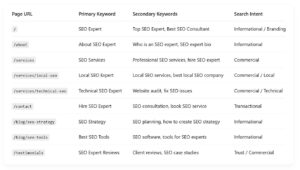🌐 What is Keyword Mapping?
Keyword Mapping is the process of strategically assigning target keywords to specific pages on your website. It’s like creating a roadmap that tells search engines exactly which page should rank for which keyword — helping you rank higher, avoid keyword overlap, and improve the user experience.
🚀 Why is Keyword Mapping Important?
Think of your website as a city and each page as a building. Keyword Mapping makes sure that every visitor (aka search query) ends up at the right address. Without it, people get lost — and so do your rankings.
Here’s why it’s a game-changer:
✅ Boosts SEO performance by aligning content with search intent.
✅ Avoids keyword cannibalization (multiple pages competing for the same keyword).
✅ Improves site structure & user flow.
✅ Ensures content is focused and relevant.
🛠️ How to Do Keyword Mapping (Step-by-Step)
1. Do Keyword Research
Use tools like Ahrefs, SEMrush, or Google Keyword Planner to find:
- Primary keywords (high intent, main topics).
- Secondary keywords (supporting phrases & long-tail variations).
2. List All Website Pages
Create a list of all current (or planned) pages: homepage, service pages, blogs, product pages, etc.
3. Assign Keywords to Pages
Match each page with the most relevant primary keyword based on:
- Topic relevance.
- Search intent (informational, commercial, transactional).
4. Create a Keyword Map (Excel/Google Sheet Example)

5. Optimize Content Accordingly
Ensure each mapped page uses the keyword in:
- Title tag.
- Meta description.
- Headings (H1, H2).
- URL.
- Body content.
- Image alt tags.
6. Audit & Update Regularly
Keyword trends and user intent change—so should your keyword map!
🌟 Pro Tips for Smart Keyword Mapping
📌 One Page = One Primary Keyword.
🎯 Always focus on user intent first, not just search volume.
💡 Use internal linking to connect related content across mapped pages.
🔍 Keyword Mapping Example: “SEO Expert Website”

✨ How This Helps You Rank
✅ Each page has a clear keyword focus — helping Google understand your site’s structure.
✅ Search intent is matched — you answer what users are truly looking for.
✅ Avoids duplication — no two pages compete for the same term.
✅ Optimized user journey — from discovering your brand to hiring you.
💡 Pro Tip:
You can also create pillar content around your main keyword “SEO Expert,” and link it to cluster content like:
- “How to Become an SEO Expert”
- “Top Mistakes SEO Experts Avoid”
- “Day in the Life of an SEO Expert”
- “SEO Expert vs SEO Agency: Which Should You Hire?”
Internal linking this way boosts topical authority and improves rankings across the board.
